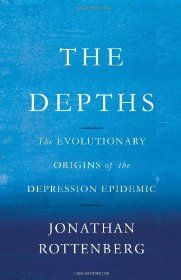Depression
A New Way of Thinking About Depression
New book suggests an intriguing model for understanding and treating depression
Posted February 12, 2014

We’ve spent billions trying to combat depression with strategies based on a defect model in which depression is seen as a chemical imbalance. Yet, despite the resources devoted to finding a pharmacological solution, 13 million U.S. adults currently suffer from depression and more than twice that number have had depression in the past. What’s more, the number of people diagnosed with depression continues to grow each year.
How can a defect model explain the growth in the prevalence of depression? Why should depression be such an epidemic?
Perhaps it’s time to consider a different approach.
In his new book, The Depths: The Evolutionary Origins of the Depression Epidemic (Basic Books, February 2014), Jonathan Rottenberg, Ph.D., draws on experimental and epidemiological data, clinical observations, and the voices of people (including himself) who have struggled with depression to offer a new and intriguing model for understanding and treating depression.
According to Rottenberg, depression is a severe outgrowth of our natural capacity for emotion—a low mood gone haywire. Rottenberg explains depression in evolutionary terms, where low mood is an adaptation to aid human survival. Moods, high and low, evolved to help us pursue rewards more efficiently. While mood shifts may have been effective for our ancestors, our modern environment with its avalanche of information can overwhelm, transforming low mood into severe, long-lasting depression.
Rottenberg’s model cautions against a one-size-fits-all solution for depression and offers insight about the recovery process. He suggests that, by changing how we think, adjusting our environment, modifying our relationships, and mending our bodies (by exercising or sleeping better) and our brains (through medications or diet), we can minimize our depressed moods.
While disease or defect models of depression define recovery by an absence of low mood, Rottenberg’s model defines recovery more comprehensively as encompassing wellness, successful self-regulation of mood, and thriving. Not only are wellness and thriving more robust and clinically meaningful endpoints than the simple absence of symptoms, but they also reflect the human goal of flourishing.
We learn how Rottenberg’s perspective differs from the defect model as he weaves the story of Sylvie throughout his book. A middle-aged woman, initially troubled by her teen-aged daughter’s struggles in school, Sylvie succumbs to the black hole of deep depression, attempts suicide, and is hospitalized. Sylvie’s recovery proceeds in stages. In the months after her release from the hospital, with help from antidepressant medication, Sylvie gradually sheds her severe physical symptoms of depression and restarts her life, returning to work as a social worker.
In a defect model of depression, this would end Sylvie’s story. But Rottenberg shows how Sylvie entered the important phase of recovery. Using her shattering depression as a lens to reevaluate everything in her life, Sylvie started on a path of post-depression personal growth. This involved dramatic new evaluations of herself and her life. She reinvented herself and developed “a new inner peace that was not available before.” She developed strategies for regulating her mood. Sylvie’s depression helped her grow in her work. She became a more competent social worker, using her experience with depression to achieve greater empathy with her patients. She is now better at spotting depression in others and is in a strong position to deliver realistic hope.
The defect model of depression encourages people to listen to medications and their effects but not to their depression itself. Antidepressant medications can be and often are part of the solution, but they are not the only solution nor are they always completely effective. Rottenberg suggests that moods have value because they offer meaningful information about our status and prospects in the world. Listening to depression can be a vehicle for fostering rebirth and transformative life change through effective mood self-regulation.
The Depths: The Evolutionary Origins of the Depression Epidemic has the potential to revolutionize the way scientists study depression and therapists treat depression. It can provide hope for people with depression and understanding for their families.
Perhaps a greater focus on evolutionary origins would enhance progress toward understanding and treating mental illnesses in addition to depression.
What do you think?




